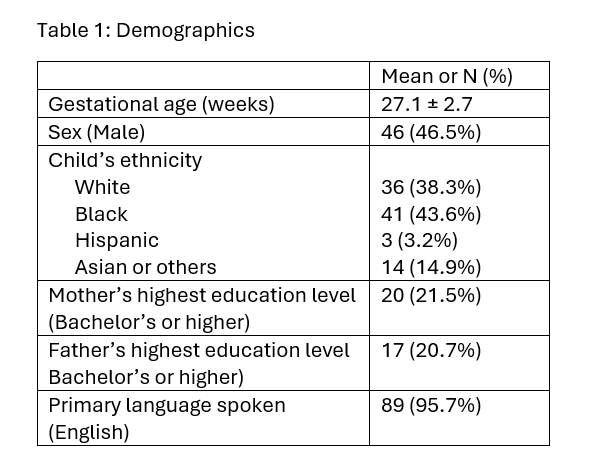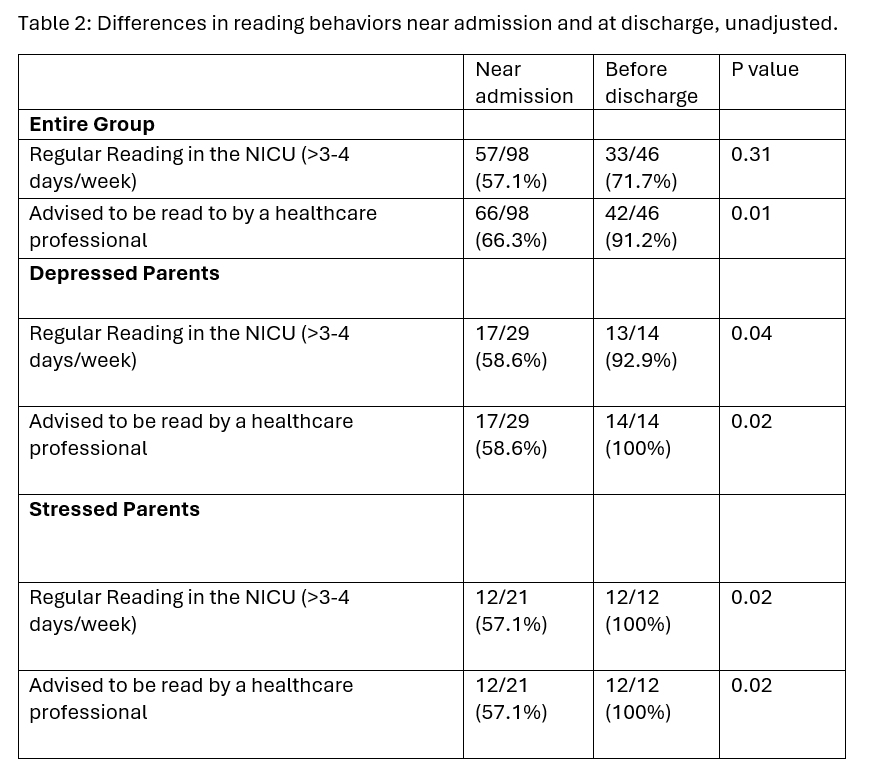Neonatal Neurology 6: Neurodevelopment
Session: Neonatal Neurology 6: Neurodevelopment
688 - Encouraging Parental Reading in NICU Parents with Stress and Depression
Sunday, April 27, 2025
8:30am - 10:45am HST
Publication Number: 688.4898
Viral Jain, University of Alabama School of Medicine, Birmingham, AL, United States; Yvonne Bolaji, University of Alabama School of Medicine, Birmingham, AL, United States; Brittany Nicole. Stewart, University of Alabama School of Medicine, Birmingham, AL, United States; Colm P. Travers, UAB, Birmingham, AL, United States; Vivek Shukla, University of Alabama at Birmingham, Birmingham, AL, United States; John Hutton, University of Texas Southwestern Medical School, Highland Village, TX, United States; Waldemar Carlo, UAB School of Medicine, Birmingham, AL, United States

Viral Jain, MD (he/him/his)
Asst Prof
University of Alabama School of Medicine
Birmingham, Alabama, United States
Presenting Author(s)
Background: Infants admitted to the NICU are at a higher risk of neurodevelopmental delay. We have shown that shared reading interventions in the NICU led to increased reading in NICU and at home and enhanced bonding behaviors, which may improve outcomes. However, we previously found that healthcare workers are less likely to advise parents who are stressed or depressed to participate. We thus established the NICU Bookworms program to increase shared parent reading behaviors, focusing especially on NICU parents with stress or depression.
Objective: Determine if parents with stress or depression in the NICU will have increased reading behaviors following the implementation of the NICU Bookworms program
Design/Methods: Parents of very preterm infants ( < 32 weeks) admitted to a level 4 NICU between Jan, 23 to June, 24 were administered validated questionnaires within 2 weeks of admission to the NICU and in the week of discharge. These questionnaires included (i) StimQ-I READ subscale to assess reading environment and shared reading practices, (ii) Edinburgh Postpartum Depression (iii) Spielberger State-Trait Anxiety Inventory. Nursing staff completed Bookworm training sessions to learn how to promote shared parent reading. Bookworm champions visited parents who were identified as clinically depressed or stressed weekly to show them how to read with their infant. A book vending machine was installed in the NICU to improve book access. McNemar's test for group differences and regression analysis to test the association of reading behavior with parental stress or depression was done.
Results: The study population comprised 98 infants with an average gestational age of 27.1 ± 2 weeks (Table 1). A positive clinical depression and stress screen was observed in 29 (29%) and 21 (21%) parents, respectively. There was an increase in regular reading frequency (>3-4 days/week) before discharge compared to that near admission in parents with stress (57% vs 100%) and depression (58% vs 93%) (Table 2). After adjusting for infant sex, gestational age and mother's education, there were no increased odds of regular reading near admission (aOR 0.71 [95%CI: 0.26, 1.92]) in parents with stress or depression. However, after the Bookworms' intervention, there were increased odds of regular reading before discharge among these parents (aOR: 16.5 (1.02, 266.0).
Conclusion(s): Parental depression and stress present a significant barrier to shared reading in the NICU among very preterm infants. A structured reading program specifically targeting parents of high risk NICU infants with stress and depression improved reading behaviors before discharge.
Demographics

Differences in reading behaviors near admission and before discharge


